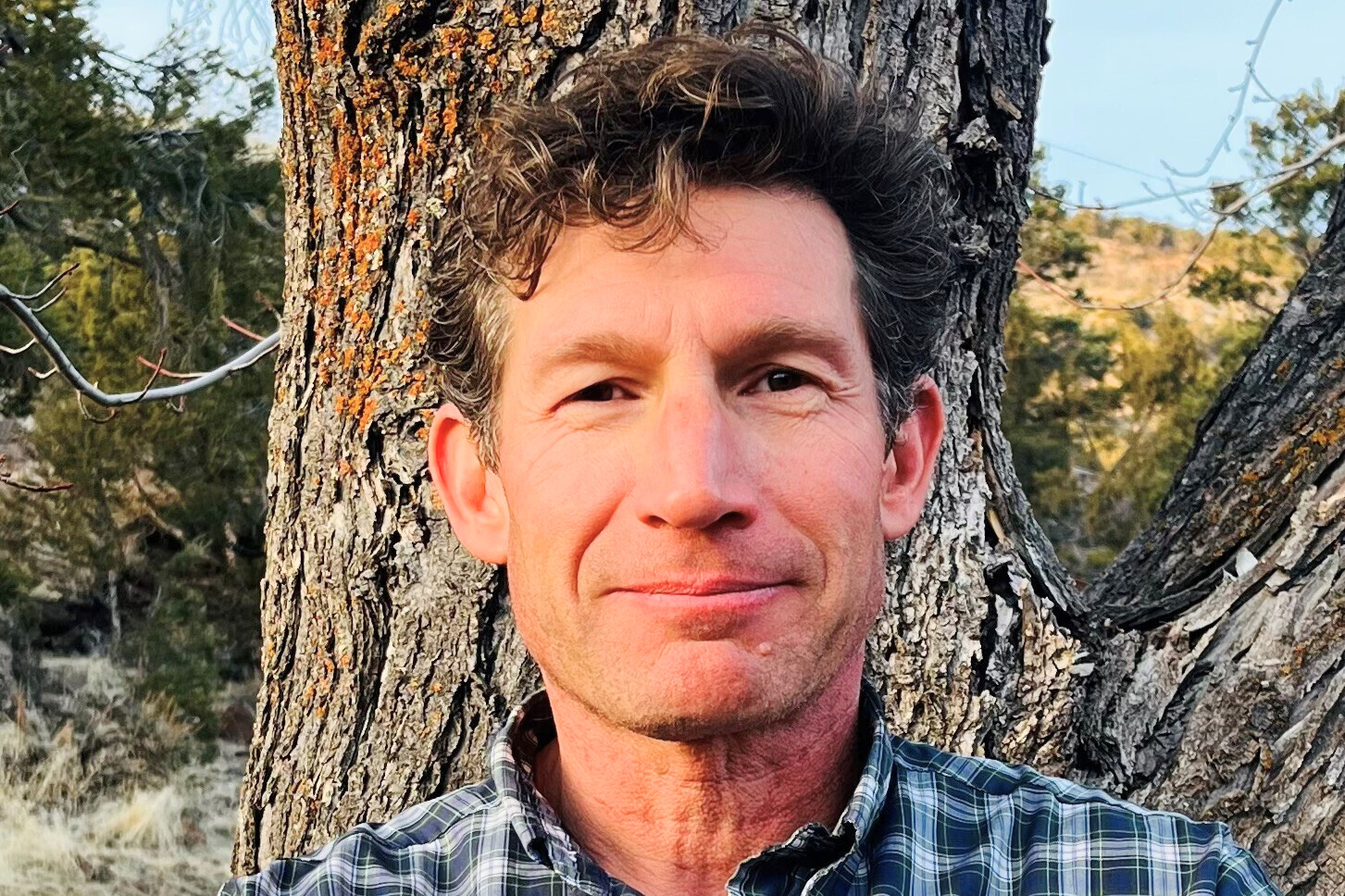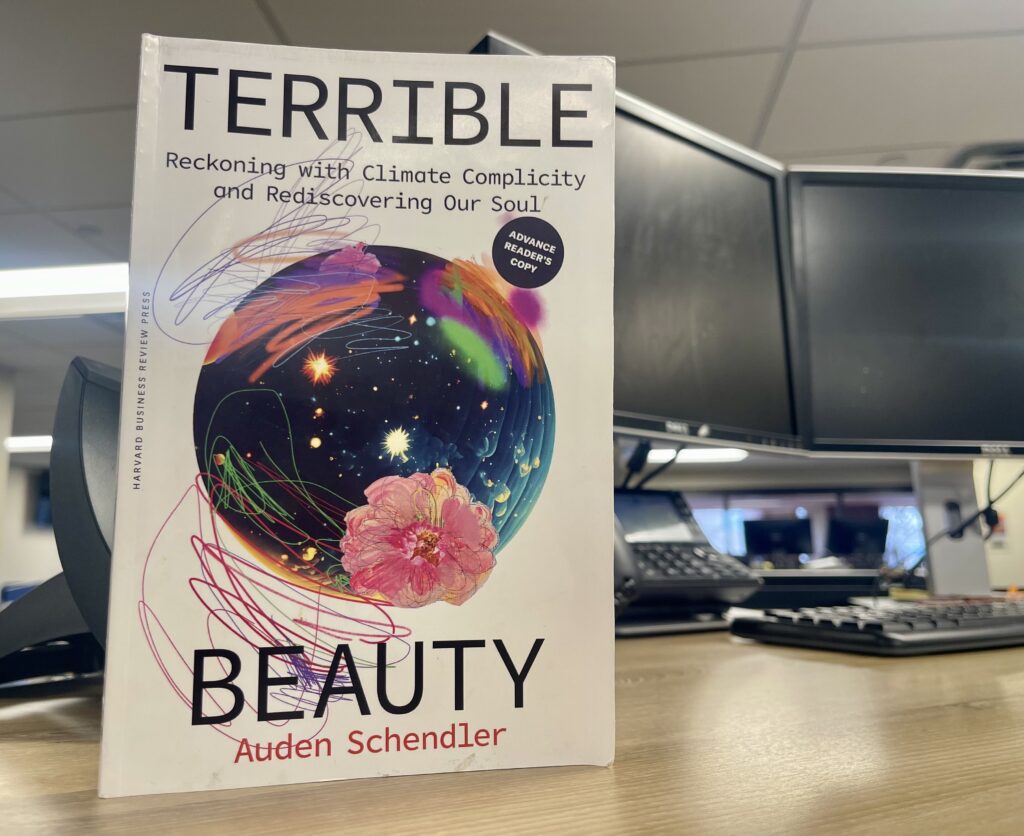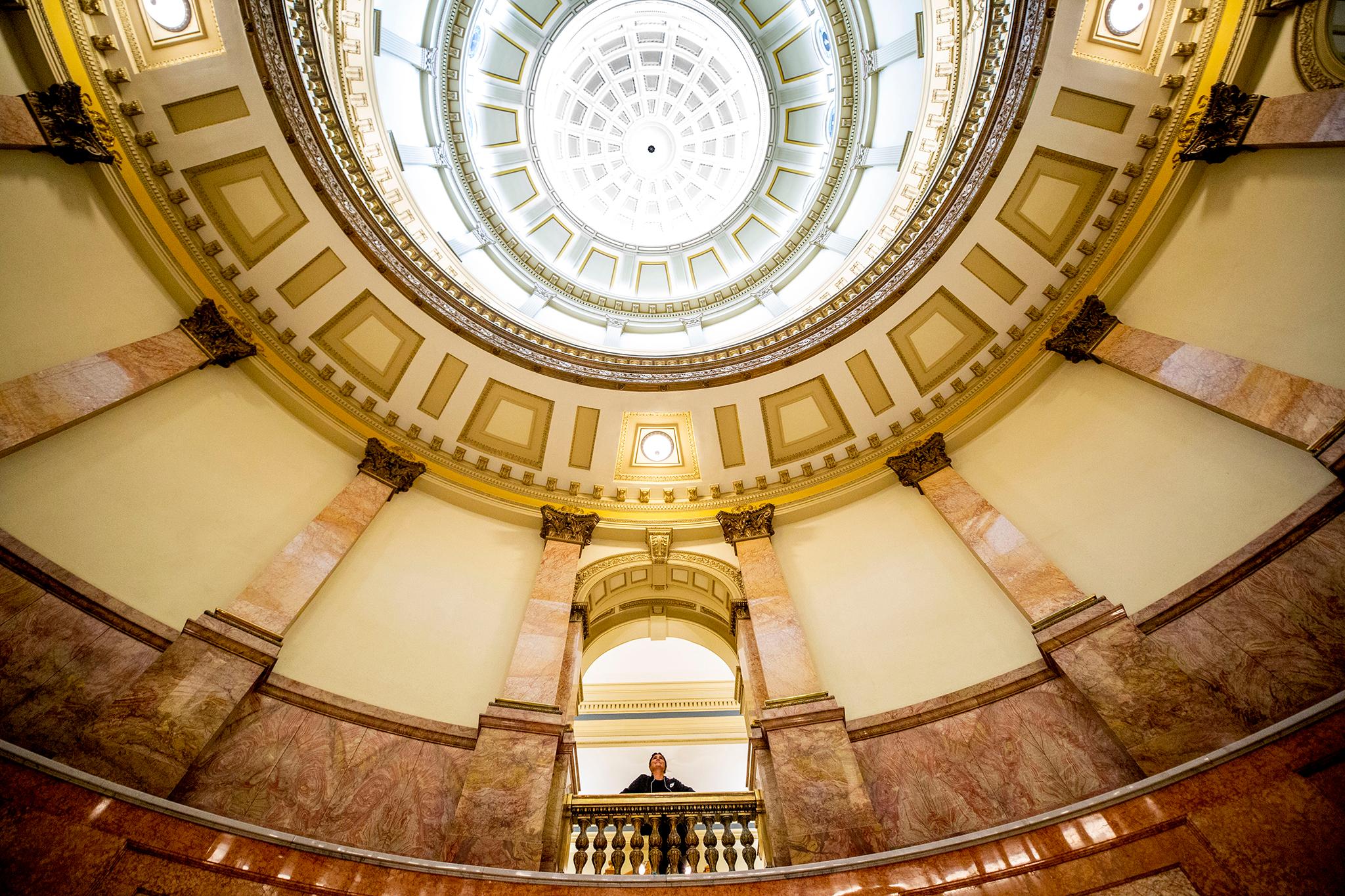
Before announcing his plan to resign come spring, Auden Schendler spent 26 years working as the vice president of corporate sustainability for Aspen One, which operates the world-famous ski resorts around the posh community on Colorado’s Western Slope.
His career led him to a tough lesson about his field: it’s a failure that perpetuates the very systems driving global warming. In his new book, "Terrible Beauty," Schendler argues corporate sustainability amounts to a set of small-scale fixes that distract the public from more effective solutions. Rather than gauge their carbon footprints and purify their recycling streams, it’s time for climate-conscious companies to enter the political arena and fight the fossil fuel industry, Schendler said.
He insists the same lesson applies to individuals worried about rising global temperatures. It’s easy enough to drive a hybrid or use paper straws, but if someone wants a better future for their children, they should fight for a carbon tax — even though Schendler fears that the ship has sailed (on rising sea levels). He says everything is worth a shot when the planet’s at stake.
Schendler joined Colorado Matters to speak with Senior Host Ryan Warner about his new book, his career and why he hopes companies consider suing ExxonMobil. The following transcript has been edited for length and clarity.
This interview has been edited for length and clarity
Ryan Warner: Let's start at the end of your book. The appendix is “How to sue ExxonMobil for Private Nuisance,” and it embodies the kind of corporate action you apparently long for. So why isn't Aspen Skiing Company suing one of the largest oil companies in the world?
Auden Schendler: Way to start at the hardest part. So my work and our work here at Aspen One, which used to be Aspen Skiing Company, has been asking the question, “What would matter if you actually cared about climate change and what would be the things that drive change at scale, that move systems, that move policy and politics?” One of the ideas that came to us, it wasn't our idea, was that a private corporation nor even a public corporation had sued a fossil fuel company for hiding science and preventing society from taking action on climate. So we actually tried this. We made a run at it pretty aggressively a number of years ago, and we weren't able to pull it off because when you suggest suing a giant corporation, there's all kinds of risk involved, including that they ask you, for example, for all your emails from the last 30 years. That's called legal discovery. So we weren't able to do it. But as you know from just following the news, there's a lot of legal action against the fossil fuel industry. And we think this is a pretty powerful leverage point to drive change. And so it's a good way to end the book because the book is all about “what would you do if you really cared?”
Warner: So you're asking someone with a greater spine than Aspen One to do it?
Schendler: I think that might be right. A company that has the specific interest in doing this– that is willing to take the risk, maybe isn't connected to other businesses. Someone's going to do it. We've done a lot of interesting and aggressive things in our work and this one didn't happen, but the idea was so good, someone's going to do it and we wanted to lay it out there.
Warner: Aren’t Boulder and San Miguel counties in Colorado suing ExxonMobil for burying scientific evidence of climate change?
Schendler: Yes, and that's how this started. I got invited to join that suit and we didn't like exactly how that suit was framed, but that's what led us to this. The difference is there are many municipalities and governments– and even trade groups – suing ExxonMobil, but there hasn't been a corporation yet.
Warner: Are there practical effects to the kind of suit you're calling for in the book?
Schendler: One of the opposition points in that lawsuit was that lawyers told me, “You can't win the lawsuit and it would take 15 years anyway.” And I said, “We're not trying to win it.” When you sue ExxonMobil, it's going to be front-page news. It's a major assault to their license to operate, and it affects their public image. It's a PR hit. So there's all kinds of value in educating the public and influencing corporate practice just by filing the suit. And I think that was actually missed by a lot of the legal counsel we got.
Warner: Your new book is part memoir, part tirade against the corporate climate movement, and part philosophy. What do you want people to take away?
Schendler: The book is trying to get at this question of the gap between what people say they care about and what they do in response to a threat to all of it. If you ask the average American, “What do you love? What do you care about?” They'd say, “My family, my partner, my children, the natural world that I visit and recreate in– those things are important to me, my community.” And then you say “Climate change is a threat to all of those things. An existential threat. What are you doing about it?” And the reality on the ground from the last election is people barely even vote. And when they take action, those actions tend to be token recycling, and they don't take the next step of saying “what would really matter?” So the takeaway from the book is that the beauty of the world, our families, the stories we tell about ourselves, these are so precious that they're worth protecting. I'm hoping that that love and that caring will propel people to do really meaningful work on climate change.

Warner: Is love a better motivator than fear?
Schendler: I think it is. Historically, we've made these arguments to work on climate: National security, energy security, protecting our economies. And the reality is that successful social movements never have a technical basis. That's not what gets humans fired up. If you think about the Civil Rights Movement, that was a moral movement. Even more modern movements like marriage equality– that was moral. So my thesis, and there's social science to back this up, is that people are going to be motivated by love and morality and ethics and humanity more than they are by a logical, technical or economic argument.
Warner: You've spent 25 years at Aspen Skiing Company– now Aspen One– a lot of that time focused on carbon accounting, shrinking the company's footprint. But you write your initial enthusiasm became eventual disillusionment. How so?
Schendler: A number of years ago, I was riding my bike at lunch (which you can do when you have a job like this) and this word kept popping into my head. The word was complicity. And I started doing a thought experiment, which was as follows, “If I were the fossil fuel industry and I wanted to ensure that corporations appeared to be taking meaningful environmental action, but not ever got in the way of the fossil fuel industry's ability to monetize $33 trillion in proven reserves, what would that program look like?” The answer was “it would look like corporate sustainability as currently practiced.” That means taking blame for the problem, focusing on your own operations, committing to the free market, to voluntary reductions, but never supporting regulation. And being a member of a trade group that actually opposes these things while you're professing that you care about them.
Warner: You're speaking of the US Chamber of Commerce there.
Schendler: Correct. Using questionable tools like carbon offsets to try to address your own issues and really never doing anything scary or dangerous to a fossil fuel status quo economy.
Warner: Is Aspen One a member of the US Chamber of Commerce?
Schendler: No, we're not.
Warner: You call a carbon tax in this book a political impossibility.
Schendler: Yeah, I think a carbon tax is a necessary solution, and it's currently a political impossibility because taxation is so verboten. But think about this: Monday morning is trash day for us, and instead of taking my trash can out onto the street and having it picked up for which I pay about $250 a quarter, what if I just dumped the trash on the street and hoped and waited for my community to pick it up, or to just suffer from my trash? That's what we're doing with CO2 pollution. It's harmful. We know how it harms people, and we are allowed to dump it into the air every day, every week for free. There's nothing free-market about that. There's nothing Libertarian about that. We should have to pay for the impact of pollution. And we don't.
Warner: Growing up in New Jersey shaped your personal environmental perspective– smoggy skies, water pollution— eventually addressed by big environmental regulations like the Clean Air Act, Clean Water Act. There is certainly the Inflation Reduction Act, which you extol throughout the book, but explain why you think this country doesn't pass these sort of sweeping environmental regulations anymore.
Schendler: I was born in New Jersey in 1970, and as I say in the book, I played baseball on top of the Lincoln Tunnel, which is the main tunnel going into Manhattan. And there would be purple plumes of pollution billowing up from the cars going in, and we'd occasionally foul balls off into the traffic and nobody seemed to care. The baseball would drop 200 feet and could have killed somebody. But this was Jersey in the 70s and 80s. You had massive inflation. You had very, very high interest rates for homes. You had the South Bronx on fire, the Vietnam War just ending. It was a dismal place.
And I grew up always thinking, “I hate New Jersey.” And when I got older, I realized, no, the Clean Air Act was passed in 1970, the Clean Water Act, 1972, and those were taking effect when I was young. And what I didn't like – what I hated – was America before environmental regulation. And so those regulations were profound, but they were also draconian. They really did change America. And part of what I posit in the book is that corporate America said “That was great, but we never again want to see that level of regulation.” That was paired with a trend toward neoliberal free market thinking, which was really boosted by Reagan, who famously said, “Government isn't the solution, it's the problem.”
Warner: I wonder if you're expecting too much from corporations. I mean, if a company is publicly traded, it has to turn a profit for shareholders. And I can imagine a CEO hearing this and thinking “Climate activism's nice, but leave it to Greta Thunberg. My job is to worry about revenue in the next fiscal quarter or holding onto employees in the next three quarters.”
Schendler: I think that's right. And in the book, I say, “Can we even count on business to be a part of this?” And where I come down is I don't think that we should throw out this very powerful potential tool. I do think things are changing. You mentioned employee retention. One of the best things our business has ever done to retain employees is environmental work. We get constant comments from new and returning employees. “I work for you because of that work. I came here because of that work.”
And the other piece is I really do think we're at a fulcrum point where business is starting to say, “You know what? Our supply chains are getting hammered by climate events. Our customers are getting hammered, our local economies, our employees, their insurance rates. This has actually become a business issue, and it's going to be cheaper to address it than not to.” The Inflation Reduction Act did not harm business in the United States. In fact, many businesses fought for it because it created jobs.
Warner: There's Ben and Jerry's, Patagonia that are starting to get more involved in climate politics, not just their own environmental footprint. Do you think that those effectively confront the fossil fuel industry? I mean, it seems like a serious mismatch, and you even describe it, I think in the book as “asymmetrical warfare.”
Schendler: I think you're going to need a lot more power to drive change, but one of my theories– and I emphasize that it's a theory– is that once you have a business lead, and get perceived as a legitimate leader on climate, and achieve that level of brand recognition, other businesses are going to say, “Holy cow, why wouldn't we do that too?!” It's something that more and more modern and younger customers care about and want. There is a business case for it. There isn't a giant financial downside because a lot of what I'm asking is public voice from corporations that doesn't cost anything. You might lose some customers, but you're probably, on balance, gaining more customers– if you trust the polling of Americans, most of whom care about this issue.
Warner: Leave us with what “Terrible Beauty” is– the title of your book.
Holding your daughter as she's going off to college, that's terrible beauty. It's beautiful. And it's terrible because she's leaving. The mortality of your partner or spouse or child is terrible beauty. And the fact that the world, which is so profoundly beautiful, even in its semi-damaged state, is threatened even more by climate change… that's terrible beauty.









